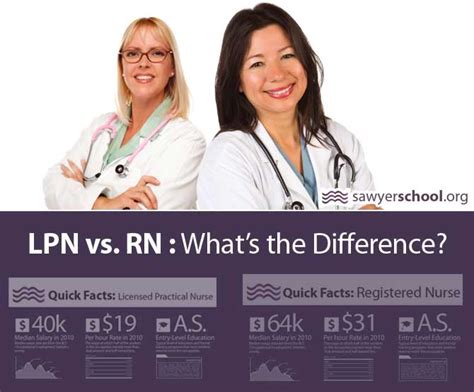Registered Nurse (Rn) Vs. Licensed Practical Nurse (Lp)

When it comes to healthcare professionals, registered nurses (RNs) and licensed practical nurses (LPNs) play crucial roles in providing quality patient care. While both professions are essential in the healthcare industry, there are distinct differences between the two in terms of education, scope of practice, and responsibilities.
Education and Training
Registered Nurse (RN)
Registered nurses undergo extensive education and training to obtain their credentials. They typically hold a Bachelor of Science in Nursing (BSN) degree, although some may have an Associate Degree in Nursing (ADN). RNs are required to pass the National Council Licensure Examination for Registered Nurses (NCLEX-RN) to become licensed.
Licensed Practical Nurse (LPN)
On the other hand, licensed practical nurses complete a practical nursing program, which usually takes about one year to complete. LPNs must pass the National Council Licensure Examination for Practical Nurses (NCLEX-PN) to become licensed.
Scope of Practice
Registered Nurse (RN)
RNs have a broader scope of practice compared to LPNs. They are responsible for providing direct patient care, administering medications, performing medical procedures, and coordinating patient care plans. RNs can work in various healthcare settings, including hospitals, clinics, and nursing homes.
Licensed Practical Nurse (LPN)
LPNs provide basic nursing care under the supervision of RNs or physicians. They assist with activities of daily living, take vital signs, administer medications, and monitor patients’ condition. LPNs primarily work in long-term care facilities, rehabilitation centers, and physician offices.
Responsibilities
Registered Nurse (RN)
RNs have a higher level of responsibility compared to LPNs. They assess patients’ health conditions, develop and implement nursing care plans, monitor patients’ progress, educate patients and their families on healthcare management, and collaborate with other healthcare professionals to provide comprehensive care. RNs also have the authority to make critical decisions regarding patient care.
Licensed Practical Nurse (LPN)
LPNs have more limited responsibilities compared to RNs. They assist with patient care activities, such as bathing, dressing, and feeding, and report any changes in patients’ conditions to the healthcare team. LPNs also provide emotional support to patients and their families and ensure a safe and comfortable environment.
Salary and Career Advancement
Registered Nurse (RN)
RNs generally earn higher salaries compared to LPNs due to their advanced education and expanded scope of practice. According to the Bureau of Labor Statistics, the median annual wage for registered nurses was $75,330 in May 2020. RNs also have more opportunities for career advancement, such as becoming nurse practitioners, nurse educators, or nurse administrators.
Licensed Practical Nurse (LPN)
LPNs earn lower salaries compared to RNs, with a median annual wage of $48,820 in May 2020 according to the Bureau of Labor Statistics. LPNs can pursue further education and become registered nurses by completing an RN program and passing the NCLEX-RN exam.
Conclusion
In summary, both registered nurses (RNs) and licensed practical nurses (LPNs) play vital roles in the healthcare industry. RNs have a higher level of education, broader scope of practice, and more responsibilities compared to LPNs. LPNs provide valuable support to the healthcare team and can choose to advance their career by becoming registered nurses. Ultimately, both professions contribute to the overall well-being and care of patients.
Frequently Asked Questions
-
What is the main difference between an RN and an LPN?
The main difference between an RN and an LPN is the level of education and scope of practice. RNs have a higher level of education and can perform more advanced nursing tasks compared to LPNs.
-
Do RNs earn more than LPNs?
Yes, RNs generally earn higher salaries compared to LPNs due to their advanced education and expanded scope of practice.
-
Can LPNs become RNs?
Yes, LPNs can pursue further education and become registered nurses by completing an RN program and passing the NCLEX-RN exam.
-
Where do RNs and LPNs typically work?
RNs can work in various healthcare settings, including hospitals, clinics, and nursing homes. LPNs primarily work in long-term care facilities, rehabilitation centers, and physician offices.
-
What are the career advancement opportunities for RNs?
RNs have more opportunities for career advancement, such as becoming nurse practitioners, nurse educators, or nurse administrators.
